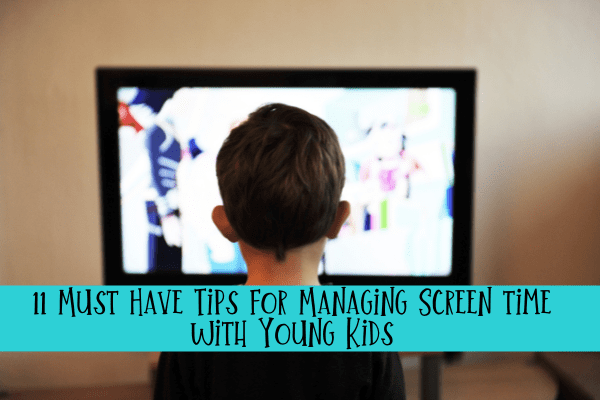As a mom, I totally get how hard it can be to manage screen time some days. When you’re exhausted, it’s freezing outside, you’re not feeling well, pregnant, or just mentally checked out—it’s tough. Sometimes you just need a break, and that’s okay.
I’ve been there.
That’s why I try to be intentional about managing screen time on the easier days. If I set some healthy boundaries when things are going smoothly, then I don’t feel as guilty on the harder days when survival mode kicks in and the screens stay on longer.
I definitely have days where my kids watch more TV than I’d like—but I try to save those for when I really need the help. On a typical day, I aim to keep TV time under two hours. Some days it’s less, and occasionally, they don’t watch at all. I also try to limit gaming to about an hour or less.
It’s not about being perfect—it’s about finding a rhythm that works for your family and giving yourself grace along the way.

Screen Time can be trained
If you feel like your kids are spending too much time watching TV or glued to their devices, don’t worry—you can help them break the habit. It might be a little tough at first (and yes, there might be some whining), but with a bit of consistency and patience, you’ll be amazed at how quickly they can adjust.
Give it a week or two, and you’ll start to see them getting better at entertaining themselves, using their imagination, and finding creative ways to stay busy. Kids are more capable than we sometimes give them credit for—they really will surprise you!
Here are a few tips and strategies that have worked well for our family. Hopefully, they’ll help you, too!
Tips for Managing Screen time for Young Kids
Busy activity
Have a go-to activity list or activity jar that you can just pull ideas out of when they are getting restless, bored, or asking to watch. Having a craft box is another handy tool. Just pull it out and let them design what they want. Here are some items you could get from the dollar store to have in your craft box.
Start an activity challenge, (FREE) to get your kids doing something different each day.
Delay Screen time
Try saying, “What if we do ___ first?” (Insert a fun activity or simple craft.)
Often, once they get started, they’ll get caught up in it and may even move on to another idea all on their own. It doesn’t always work, but when it does, it’s such a win! Sometimes they’ll even forget about screens for a while—and that little break can make a big difference.
Earn/lose screen time
You can create a simple system where your kids earn their screen time through positive behavior—like completing chores, following directions, or being extra helpful. On the flip side, they can lose screen time when they’re not listening or skipping their responsibilities.
For example, they might earn 15 minutes for each completed chore or an hour for a great day of listening and cooperation. The key is consistency and keeping it fun and encouraging. This kind of system not only helps manage screen time but also teaches responsibility and rewards good habits in a positive way.
Here is a Pokémon reward chart, or a cars reward chart, or Unicorn Chart.
You can also give out reward bucks!
Challenge yourself
If you’re having a good day—feeling patient, energized, and up for it—challenge yourself to go screen-free for the day. Instead of turning on the TV, try gently redirecting their attention:
“Hey, you haven’t played outside yet today,”
or “Let’s do a fun craft together,”
or even “Let’s see how fast we can clean up your toys!”
It might take a little creativity, but those screen-free days can add up in a powerful way. And the best part? On those tougher days—when you really need the break—you can feel a lot less guilty knowing they’ve had plenty of tech-free time in between.
Aim for a Certain Amount
Screen time definitely has its perks—it can be educational, entertaining, and sometimes it gives you the break you really need. But it’s important to find a healthy balance that works for your family and stick with it consistently.
Set a daily screen time limit that feels right for your household. For us, that’s usually about two hours a day. Once you’ve decided on a limit, make it clear to your kids so they know what to expect. When they ask for more, you can gently say, “We’ve already hit our two hours today.” No arguments, no guilt—just a simple boundary that becomes part of your routine.
Creating those healthy habits now can make screen time easier to manage in the long run—and give everyone more room for play, creativity, and connection.
Explain why excessive screen time can be harmful
Kids love to be responsible for information. Explain to them why it’s important that we don’t watch a lot of TV and how healthy it is to play and be creative. Let them know when they’ve hit their limit and help them monitor their own watching habits.

Spend time together
Usually when you take some time out of your day to do a craft or activity with your kiddo, they are more likely to be creative themselves. They start coming up with their own ideas, and they want to spend less time staring at a TV. Try to get out once a day doing something fun together! Here is a list of 43 fun and frugal things to do.

If you see an endless Summer in front of you, check out The Ultimate Summer Binder with over 60+ activities to enjoy this Summer!

Share an alternative
Sometimes when my kids want to watch but I don’t really want them to, I suggest a dance party or interactive videos instead. They are still “watching”, but they are also getting exercise and moving around. If I catch them not dancing, the TV goes off. There are several YouTube videos that can lead kids in dancing, exercises, and fun games. This is a great winter activity for when you’re stuck inside, but need to get energy out!
Introduce Quiet time
If your kids have outgrown naps, you can still create a daily quiet time in your home. It’s a great way to give everyone a break—especially you—and helps kids learn to enjoy some independent play.
In our house, we do one hour of quiet time in their rooms each day. We also have a special Quiet Time Box that only comes out during that hour, filled with quiet activities and toys they don’t usually have access to. Because it feels new and special, they’re more likely to engage with it.
If you haven’t done quiet time before, it might take a little time for your kids to adjust—but stick with it! It gets easier with consistency, and it can become a peaceful part of your daily rhythm.
Check out this post where I share exactly how we made quiet time work in our home!
Be okay with messes and running around
If the kids are watching less TV, they are probably making more messes and running around. Be okay with some mess. Maybe start putting in your routine to clean up every night before bed. Let them be creative and explore.

Don’t ask them
Are you offering TV to your kids before they even ask for it? Maybe they’re bouncing off the walls and you just need a break—totally understandable! But before defaulting to screen time, try offering an activity or suggesting something fun to do instead.
You might be surprised—sometimes my kids go an entire day without even asking to watch TV simply because I didn’t bring it up first. The key is not to introduce the idea unless they do. Give them a chance to get creative or find their own fun before reaching for the remote.
Don’t feel guilty
We all have those days when life feels overwhelming and the kids end up watching way too much TV. Don’t beat yourself up—it happens to every parent at some point. You’re definitely not alone.
When I was pregnant with my son, my daughter watched Little Einsteins practically all day long—and you know what? We survived just fine. So give yourself grace. Some days are just about getting through, and that’s okay. Be gentle with yourself—you’re doing better than you think.
What if they’re addicted?
If your kids are constantly begging to watch TV or play video games—and especially if they melt down when you say no—it might be a sign that they’re becoming a little too dependent on screens.
But don’t worry—you can reset things.
When I notice my son asking to play on my phone all day, every day, we take a break. I call it a “screen fast”—we go a full week with no phone time. I won’t lie, the first few days are tough, but then something amazing happens: he stops asking so much. The same strategy works with TV too.
A little reset like this can help them remember how to enjoy other things again. And it helps you feel more in control of screen time, too.
Managing Screen Time
I’m not claiming that my way is the perfect formula—but it’s what works for me and my family. The truth is, every family is different, and what works in one household might not work in another. It takes some trial and error, a little patience, and a lot of flexibility. Yes, it can take effort to set boundaries and stick to them, but it’s absolutely worth it when you think about your kids’ overall well-being.
That said, don’t be too hard on yourself. Some days will be full of screens, and that’s okay. Life happens. It’s all about balance—giving yourself grace when things don’t go perfectly, and gently guiding your family toward healthier habits over time. You’ve got this!
Related: 31 Cheap Crafts for Kids that Cost less than Five Dollars
Related: 11 Engaging Activities for Toddlers that they will Love
Related: 9 Science Experiments for Kids with Household Items











I don’t have children, but these methods may work wonders with my nieces and nephews.
These methods are great charlie! Thank you so much. Covid days have really confined our kids nowadays, many of parents like us relay on-screen devices to keep our kids occupied. Would really appreciate it if you included my website https://www.learnonpiano.com/free-keyboard-lessons-beginner-friendly-step-by-step/ on one of your articles, as learning piano could be very beneficial for our kids!
Emily xx
I totally agree! No problem! And yeah, I’ll look into your site and see if it’s a good fit in one of my articles. Thanks for commenting!
This article amazing post. This article informative for us. it is help to. this article is exposition very well.
M R Mamun recently posted…Fitbit Luxe Ship Date